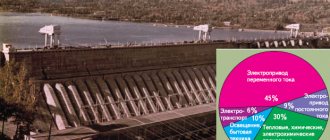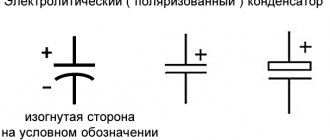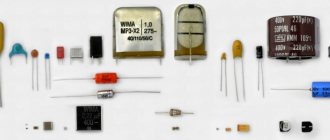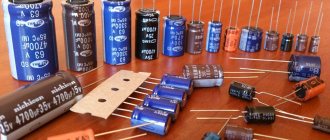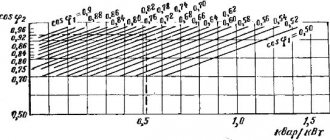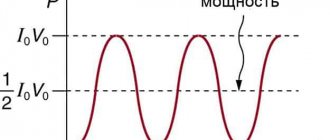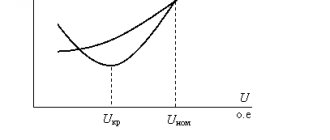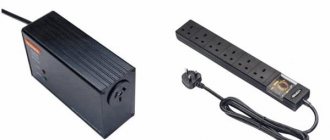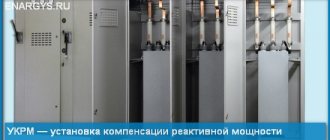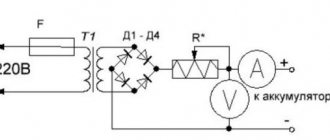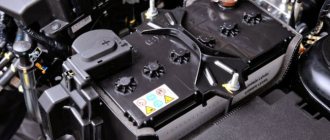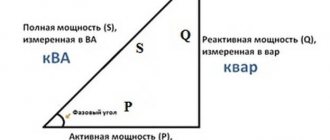Reactive power sources are almost all electric motors, both large and small (for example, a fan in a computer unit). More complex reactive power source devices are nonlinear elements - for example, semiconductor devices (regulators, rectifiers, switching power supplies, etc.), which are widely used in modern consumer electrical installations.
In most consumer electrical installations, significant inductive reactive power is generated. This applies to industrial plants as well as office and residential load centers.
Reactive power not only wastes a portion of the energy produced by generators on the grid. With an increase in inductive power, the voltage on the buses of substations of electricity consumers decreases. A feature of modern semiconductor regulators is that as the voltage decreases, they begin to consume more current. Which in turn leads to an even greater increase in reactive power. This can lead to a cascading accident - the so-called voltage avalanche. When a decrease in voltage in the external network (for example, as a result of repairs or an accident) leads to an explosive increase in the reactive load of the consumer and to an emergency decrease in voltage in the network.
Therefore, reactive power compensation is not only a means of increasing the efficiency of equipment and the quality of electrical energy, but also a means of ensuring the reliability of power supply.
Since most electrical installations of consumers generate inductive power, it can be compensated using special capacitor units - banks of static capacitors (SCB). Electrically, the BSC is a capacitor whose power is approximately equal to the equivalent inductive power of the consumer's electrical installation. BSK compensates for the decrease in bus voltage and increases the power factor.
A battery of static capacitors (shunt capacitor bank) is an electrical installation consisting of capacitors, auxiliary electrical equipment and a busbar, designed to compensate for reactive power and increase voltage. BSK are installed in AC electrical networks with voltages of 0.4 – 500 kV.
BSK - general
The issue of efficient use of fuel and energy receives a lot of attention in many countries around the world.
In the strategic development plan of many countries, a separate aspect is allocated to the competent use of available energy. To achieve maximum effect, it is necessary to consider all stages: from the generation of electrical energy to its final use. The supply of electrical energy over many kilometers using power lines in any case leads to inevitable losses. In this case, there is an increase in the load of equipment that is designed to redistribute energy. Thus, there is a decrease in the reliability of the functioning of parts of energy networks. Free consultation with a BSC Engineer
BSK CONSTRUCTION
Today, open-type BSKs are most in demand for operation directly at the outdoor switchgear without the construction of additional buildings. BSK produced by UKKZ LLP fully meet the requirements of GOST 15543.1-89 in terms of technical requirements for resistance to climatic factors for UHL1 regions.
The batteries are equipped with single-phase cosine capacitors of the KEPF type. Inside the capacitor, fuses are installed in series with each capacitive element, which ensure localization of internal damage, preventing the capacitor from failure.
Purpose and scope
BSK are used to increase the power factor in electrical networks. They allow reactive power to be produced at load nodes rather than at remote power stations, which reduces voltage and power losses in the power supply system. They are used in close proximity to large load nodes on the high voltage side. Individual and group reactive power compensation (RPC) is carried out by various devices at a voltage class of 0.4-6-10 kV; at high voltage, with the help of BSK, centralized RPC is usually carried out.
Connecting the BSK to the power grid
Capacitor banks can be connected in two ways:
- using a common control device with electricity receivers (asynchronous motor, power transformer, etc.);
- through a separate device designed to turn on or off only capacitors.
In installations up to 1 kV, static capacitors are switched on and off automatically. Those used at voltages above 1kV are connected to or disconnected from the network by means of power disconnectors or circuit breakers.
To reduce the cost of switching equipment, it is recommended to use capacitor banks of the following capacities:
- 30 kvar up to 1 kV;
- 100 kvar at 6-10 kV and connecting the battery to the general switch of the power transformer or other electrical receiver;
- 400 kvar at 6-10 kV and connected to a separate switch.
Problems solved by installing BSK
Using installations, it is possible to successfully solve a number of the following problems:
- Reduced energy losses;
- Voltage level equalization;
- Improving power quality;
- Reducing the use of reactive energy;
- Increasing the capacity of existing electrical networks without using the capacity of power plants;
- Maintaining the stability of the electrical supply system components.
| Modern production | Individual order | All batteries are in stock |
BATTERIES OF STATIC CAPACITORS BSK AND BLOCKS OF CAPACITORS TYPE BKE
Designed to complete shunt batteries with a voltage of 6; 10; 35; 110 and 220 kV frequency 50 Hz.
| Standard rating | Voltage, kV | Power, kvar | Capacity, µF | Overall dimensions (length x width x height), mm | Weight, kg |
| BKE1-1.05-252 U1 | 1,05 | 252 | 728 | 900 x 580 x 575 | 150 |
| BKE1-1.05-300 U1 | 300 | 866 | |||
| BKE1-2,1-400 U1 | 2,1 | 400 | 289 | ||
| BKE2-1.05-500 U1 | 1,05 | 500 | 1444 | 900 x 580 x 910 | 260 |
| BKE2-1.05-600 U1 | 600 | 1732 | |||
| BKE2-2.1-800 U1 | 2,1 | 800 | 578 |
Fuses in BSK Batteries
| Battery with external fuse | Battery with internal fuses | Battery without fuses |
Design features of static capacitor banks
Currently, open-type BSKs are in high demand for use directly at outdoor switchgear. In this case, it is not necessary to erect a number of additional buildings. The devices produced by NPO PromElectroAvtomatika LLC fully meet the requirements of the relevant standards. They meet all technical requirements that apply to devices for resistance to the negative effects of climate. The complete set of units includes a capacitor of the KEPF type (with one phase). Fuses are placed inside it to help identify areas where a malfunction has occurred. In this case, the capacitor continues to function. This allows for uninterrupted operation of all devices over a long period of time. The capacitors are located directly in metal frames, which are made from special materials. They have an anti-corrosion coating that protects it from the negative effects of the environment. The capacitors are insulated based on the capabilities of the device housings. Electrical connections of capacitors are made with flexible wires with multiple cores and bus bars. Flexible conductors are connected using a die clamp, which was specially designed for this purpose. This avoids oxidation. It is also worth noting the use of a special electrically conductive lubricant, which ensures a minimum level of resistance.
All BSKs are connected to each other to signal the occurrence of an emergency and errors during their use. In the event of a mechanical impact on the capacitor section in the event of an emergency, the fuse located inside will blow. This leads to a transformation of the capacity of one of the existing battery arms. Subsequently, the unbalance current moves in the conductor, controlled by a special relay. It directly activates an alarm indicating the occurrence of an unusual situation in the operation of the device. The lowest current level of this type occurs when a capacitor placement plan is formed individually for each unit.
At the customer's request, capacitor blocks for high-voltage shunt batteries for other voltages and powers can be developed and manufactured with both vertical and horizontal arrangement of capacitors in the blocks. Batteries of static capacitors BSK for voltage 35; 110 and 220 kV are developed and manufactured according to individual customer requirements.
- 1193,6613,5
| № | Battery rating designation | Rated voltage, kV | Maximum permissible voltage, kV | Nominal capacity, µF | Rated power, MVAr |
| 1 | BSK-6-2.7 UHL1 | 6 | 7,2 | 238,73 | 2,7 |
| 2 | BSK-6-4 UHL1 | 353,68 | 4 | ||
| 3 | BSK-6-5.4 UHL1 | 477,46 | 5,4 | ||
| 4 | BSK-6-6 UHL1 | 530,52 | 6 | ||
| 5 | BSK-6-6.7 UHL1 | 592,41 | 6,7 | ||
| 6 | BSK-6-8 UHL1 | 707,36 | 8 | ||
| 7 | BSK-6-9.4 UHL1 | 831,14 | 9,4 | ||
| 8 | BSK-6-10 UHL1 | 884,19 | 10 | ||
| 9 | BSK-6-12 UHL1 | 1061,03 | 12 | ||
| 10 | BSK-6-13.5 UHL1 | ||||
| 11 | BSK-10-2.5 UHL1 | 10 | 12 | 79,58 | 2,5 |
| 12 | BSK-10-3.75 UHL1 | 119,37 | 3,75 | ||
| 13 | BSK-10-5 UHL1 | 159,15 | 5 | ||
| 14 | BSK-10-5.65 UHL1 | 179,85 | 5,65 | ||
| 15 | BSK-10-7.5 UHL1 | 238,73 | 7,5 | ||
| 16 | BSK-10-8.75 UHL1 | 278,52 | 8,75 | ||
| 17 | BSK-10-10 UHL1 | 318,31 | 10 | ||
| 18 | BSK-10-11.25 UHL1 | 358,10 | 11,3 | ||
| 19 | BSK-10-12.5 UHL1 | 366,06 | 11,5 | ||
| 20 | BSK-10-13.15 UHL1 | 418,58 | 13,2 | ||
| 21 | BSK-10-15 UHL1 | 10 | 12 | 477,46 | 15 |
| 22 | BSK-35-3.8 UHL1 | 35 | 40,5 | 9,87 | 3,8 |
| 23 | BSK-35-5.1 UHL1 | 13,25 | 5,1 | ||
| 24 | BSK-35-7.6 UHL1 | 19,75 | 7,6 | ||
| 25 | BSK-35-10.2 UHL1 | 26,50 | 10,2 | ||
| 26 | BSK-35-11.4 UHL1 | 29,62 | 11,4 | ||
| 27 | BSK-35-15.2 UHL1 | 39,50 | 15,2 | ||
| 28 | BSK-35-19 UHL1 | 49,37 | 19 | ||
| 29 | BSK-110-12.5 UHL1 | 110 | 126 | 3,29 | 12,5 |
| 30 | BSK-110-17 UHL1 | 4,47 | 17 | ||
| 31 | BSK-110-25 UHL1 | 6,58 | 25 | ||
| 32 | BSK-110-34 UHL1 | 8,94 | 34 | ||
| 33 | BSK-110-37.5 UHL1 | 9,86 | 37,5 | ||
| 34 | BSK-110-50 UHL1 | 13,15 | 50 | ||
| 35 | BSK-110-63 UHL1 | 16,57 | 63 | ||
| 36 | BSK-110-67 UHL1 | 17,63 | 67 | ||
| 37 | BSK-110-75 UHL1 | 19,73 | 75 | ||
| 38 | BSK-110-84 UHL1 | 22,10 | 84 | ||
| 39 | BSK-110-91 UHL1 | 23,94 | 91 | ||
| 40 | BSK-110-100 UHL1 | 26,31 | 100 | ||
| 41 | BSK-110-113 UHL1 | 29,73 | 113 | ||
| 42 | BSK-110-125 UHL1 | 32,88 | 125 | ||
| 43 | BSK-110-134 UHL1 | 35,25 | 134 | ||
| 44 | BSK-110-143 UHL1 | 37,62 | 143 | ||
| 45 | BSK-110-156 UHL1 | 41,04 | 156 | ||
| 46 | BSK-220-25 UHL1 | 220 | 252 | 1,64 | 25 |
| 47 | BSK-220-33.5 UHL1 | 2,20 | 33,5 | ||
| 48 | BSK-220-50 UHL1 | 3,29 | 50 | ||
| 49 | BSK-220-67 UHL1 | 4,41 | 67 | ||
| 50 | BSK-220-75 UHL1 | 4,93 | 75 | ||
| 51 | BSK-220-100 UHL1 | 6,58 | 100 | ||
| 52 | BSK-220-125 UHL1 | 8,22 | 125 | ||
| 53 | BSK-220-134 UHL1 | 8,81 | 134 | ||
| 54 | BSK-220-150 UHL1 | 9,86 | 150 |
Design of static capacitors for reactive power compensation
The main design elements of capacitors are a tank with insulators and a removable part, consisting of a battery of sections of simple capacitors.
Capacitors of a single series with voltages up to 1050 V inclusive are manufactured with built-in fuses connected in series to each section. Higher voltage capacitors do not have built-in fuses and require separate installation. In this case, group protection of the capacitors is carried out using fuses. When performing group protection in the form of fuses, one fuse protects every 5-10 capacitors, and the rated current of the group does not exceed 100 A. In addition, common fuses are installed for the entire battery.
For capacitors with voltages of 1050 V and below that have built-in fuses, general fuses are also installed for the battery as a whole, and if the battery power is significant, for individual sections.
Depending on the network voltage, three-phase capacitor banks can be equipped with single-phase capacitors with a series or parallel connection of capacitors in each phase of the battery.
"H-type" circuit
Naturally, the batteries are supplied based on the needs of the customer. The devices consist of a frame made of special types of metals in which capacitors are placed. To protect the capacitors, they are galvanized. Also in the device body there are various types of insulators, bus bars, devices for measuring current, units to enhance the protection of the device, reactors that limit the current and a set of accessories. The company's products can be supplied either assembled or disassembled. The final collection is carried out under the control of the head of the enterprise’s engineering service. Many years of successful battery production can greatly simplify installation, reducing time and material costs for installing the device. Thus, the company’s products are distinguished by their quality and reasonable cost.
BSK device
Typically, a complete battery consists of the following elements:
- single-phase capacitors;
- firing fuses;
- grounding switches;
- interconnect system for different batteries;
- overload protection;
- current limiting reactors;
- imbalance protection;
- BSK set (consists of: connectors, bolts and nuts, insulator, frame).
If you want to buy a battery of capacitors, we suggest contacting. Here you will find the products you are interested in at reasonable prices.
Distinctive features of BSK LLC NPO PromElektroAvtomatika
All products of the enterprise undergo mandatory certification. They have an adequate price, which quickly pays for itself. Thanks to many years of operation, devices produced by NPO PromElectroAvtomatika LLC are reliable and will serve for many years. The devices are developed based on individual customer requirements, which allows us to take into account all the nuances. The implementation of numerous projects that are being implemented in many countries around the world confirms the success of the work of NPO PromElectroAvtomatika LLC. Much attention in the work of the enterprise is paid to quality control. All products undergo mandatory testing, which confirms their potential for further use and application. If you are interested in BSK, then you can contact us at the indicated telephone numbers. You will be able to ask questions that interest you regarding our products. Below is a product catalog where you can download. Here are presented various types of BSK, from which you can select the device models that interest you.
BSK-35-15 BSK-6.3-9.2 BSK-12.64-7.2 BSK-103-30 BSK-103-30
